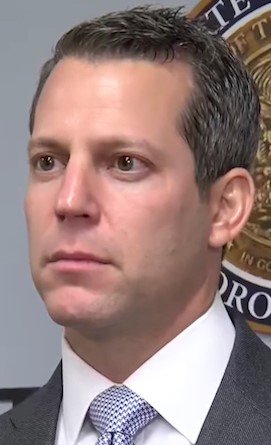
Appeals court tosses out ruling in Warren case

By Jim Saunders
News Service of Florida
Focusing on First Amendment violations, a federal appeals court ordered a district judge to reconsider a lawsuit challenging Gov. Ron DeSantis’ suspension of Hillsborough County State Attorney Andrew Warren.
The ruling by a three-judge panel of the 11th U.S. Circuit Court of Appeals vacated a decision last year by U.S. District Judge Robert Hinkle that allowed the suspension to stand.
Last Wednesday’s ruling said the suspension violated First Amendment protections in a series of ways and directed Hinkle to look again at whether DeSantis had legitimate policy grounds to oust the twice-elected prosecutor.
DeSantis has touted his suspension of Warren, a Democrat, as he runs for the Republican presidential nomination.
“The First Amendment prevents DeSantis from identifying a reform prosecutor and then suspending him to garner political benefit,” said the 48-page main opinion, written by Judge Jill Pryor and joined by Judge Anne Conway. “On remand, DeSantis must prove that unprotected activity, such as Warren’s actual performance or his policies, motivated him to suspend Warren.”
Judge Kevin Newsom wrote a concurring opinion that quoted DeSantis referring to the suspension during a presidential debate. He said a statement that Warren signed about abortion laws — one of the issues DeSantis cited in suspending Warren — was protected speech.
“Bottom line: The Supreme Court has made clear — for reasons that cut to the core of our representative democracy — that the First Amendment safeguards elected officials’ right to express their views on salient political issues,” Newsom wrote. “Whatever one thinks of Warren’s particular views about abortion, he is no less entitled to that protection.”
Warren issued a news release that described the appeals-court opinion as a “major legal victory.”
“This is what we’ve been fighting for from the beginning — the protection of democracy,” Warren said in a prepared statement. “We look forward to returning to the district court to obtain the relief that has been denied to me and all the voters of Hillsborough County for 17 months: reinstating the person elected by the voters.”
DeSantis suspended Warren in August 2022, accusing him of “incompetence and willful defiance of his duties.” DeSantis’ executive order, in part, pointed to Warren signing a national organization’s statement about refraining from prosecuting abortion cases.
The governor also targeted Warren for signing a statement that criticized laws restricting care for transgender people. In addition, DeSantis cited Warren policies that could limit prosecution of cases related to bicycle and pedestrian stops by police and certain low-level offenses.
Warren filed a lawsuit, arguing that the suspension violated his First Amendment rights. Hinkle considered a series of issues about DeSantis’ motivations for issuing the suspension.
Hinkle found that the First Amendment protected Warren on two factors — his political affiliations and advocacy for criminal-justice reform, last Wednesday’s appeals-court ruling said. Nevertheless, he concluded that DeSantis would have suspended Warren based on other factors that were not protected by the First Amendment.
But the appeals court ruled that two of those other factors were protected by the First Amendment. One of those factors was consideration of the statement that Warren signed about abortion. The other factor was DeSantis’ “anticipated political benefit from suspending a progressive prosecutor,” last Wednesday’s ruling said.
The appeals court said the First Amendment protects Warren from decisions based “solely on political benefit.” It said facts in the case showed that “DeSantis based Warren’s suspension on his reputation as a ‘reform prosecutor.’ DeSantis’ political benefit was solely derived from Warren’s political ideology.”
In sending the case back to Hinkle for reconsideration, the appeals court directed him to look at other motivations that DeSantis asserted in the suspension — the issues related to limiting prosecution of cases related to bicycle and pedestrian stops by police and certain low-level offenses.
“On remand, the district court should reexamine whether DeSantis would have suspended Warren based solely on the unprotected activities that motivated the suspension: Warren’s performance, his low-level offense policy and his bike policy,” the opinion said.
Also, a footnote in the opinion rejected a conclusion by Hinkle that he would not have authority to reinstate Warren.
“DeSantis argues that even if Warren prevails on the merits of his claim, the district court lacks the authority to reinstate Warren. We reject this argument. The Eleventh Amendment permits federal courts to remedy First Amendment violations,” the footnote said, referring to the U.S. Constitution’s 11th Amendment, which addresses issues about lawsuits against states.
DeSantis appointed Susan Lopez, a former county court judge, to replace Warren as state attorney. Lopez is seeking election this year to the prosecutor’s post.
Warren announced Monday that he would not try to regain the seat in the November election. The announcement said he decided not to enter the race “following an assessment that showed a high risk” that DeSantis “would simply repeat his illegal suspension of Warren” and replace him.
DeSantis last year also suspended Monique Worrell, a Democrat elected in 2020 as state attorney in the 9th Judicial Circuit in Orange and Osceola counties. Worrell is challenging her suspension at the Florida Supreme Court.
Pryor was appointed to the Atlanta-based appeals court by former Democratic President Barack Obama, while Newsom was appointed by former Republican President Donald Trump. Conway is a senior U.S. district judge appointed by former Republican President George H.W. Bush. Though a district judge, she was designated to serve on the appeals-court panel in the Warren case.







